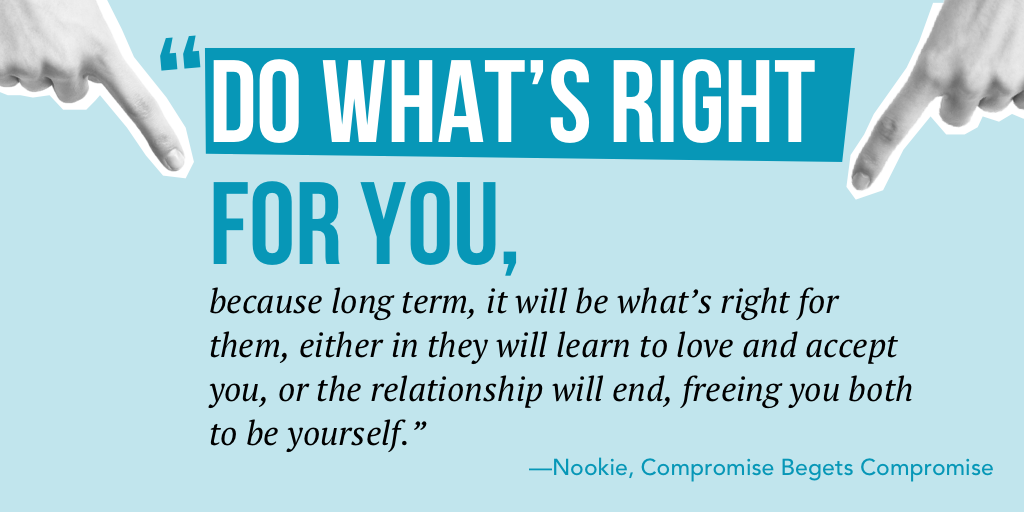Compromise behaviors create environments that require more of the same behaviors.
—Weick 1979
Sit with that a minute, and think of compromises you’ve made in relationships. Little things that seemed like nothing at the time, and then locked you into a pattern of agreement and behavior.
Perhaps you even tried to break out of that pattern, only to be told, “But you’ve always LOVED my hair curly! What do you mean you’ve been lying to me all this time?”
Once you left that relationship, you realized you’d compromised yourself right out of who you were to begin with.
Is compromise bad, them? Well, maybe not for you, or how you practice it. Yes, for me and to me, it is, (and I wrote about it in detail, here). Because it’s about finding a midway between two people’s personalities, rather than a place for both to grow and thrive in who they are, exactly as they are.
So, what can we do to celebrate our individuality, instead of compromising it away?
1. Realize that compromise tends towards sexism.
Women/female presenting people are expected by society to listen and compromise more than men.
Could this be playing a part in your relationship, either as one, or with one? Ask yourself or your partner if they feel they compromise more/less than you do. Listen to the answer that comes, no matter how difficult it might be to swallow. Then do something about it.
2. Pay attention to what you feel is right for you AND your partner.
TheFerrett wrote a piece a long time ago that resonated with me about poly people being ‘temporarily monogamous’ for new partners not sure about poly, and how that rarely works out, because it creates an atmosphere of compromise and expectations, while allowing you BOTH to get entangled.
Do what’s right for you, because long term, it will be what’s right for them, either in they will learn to love and accept you, or the relationship will end, freeing you both to be yourself.
(Yes, I’m being simplistic, here. If you’re a malignant narcissist, doing what’s ‘right’ for you might be harmful to others, and that’s not what I mean at all.)
3. Look for ways that you can both honor the other and get what you want.
I would LOVE a partner who is EXACTLY as social as I am, when I’m social and perfectly as antisocial as I am when I’m cocooning. No more, no less. And yet, I haven’t found that.
So, I realize that they may want to stay home, and I may want to go out (or vice versa), and so I do what’s right for me: what I truly want and personally need (at that time) to do. I also honor their choice, and don’t give them guilt about it, because that’s a sucky way to be.
Of course, if one or the other of us is constantly breaking commitments, and it’s causing resentment, that is a problem worth looking at and attempting to find a solution for.
4. Realize that you can’t make agreements FOR someone.
This is a big issue that seems common sense, but is far from, apparently.
A huge fight, and “Do you agree to XYZ, since you obviously can’t ABC?” happens. They balk. You pressure. They resist. You steamroll them. Add guilt, maybe. Shame them. They finally capitulate.
To your eye, that’s a compromise, fair and square. It’s an agreement. To them, it’s something they will likely resist doing, be late for, or do poorly, because they were not heard or understood, nor were they honored.
5. Consider other ways of framing the idea:
Collaboration, cooperation, teamwork, reciprocity, responsiveness, alliance, joint effort…
How might any or all of these words, when used, change how you and your partner tackle a potential issue in your relationship?
Ask: How can we both get what we want/need out of this?
Now, some of you may disagree with me. And that’s your right. However, rather than arguing with me about whether or not I am right to compromise in my relationships (which is none of your business), take a bit of time to think about how you define compromise, and what you might be able to do with it (or do away with it) to better your relationships.
Also, here’s an interesting article about compromise you might find relevant: To Compromise or Not to Compromise









